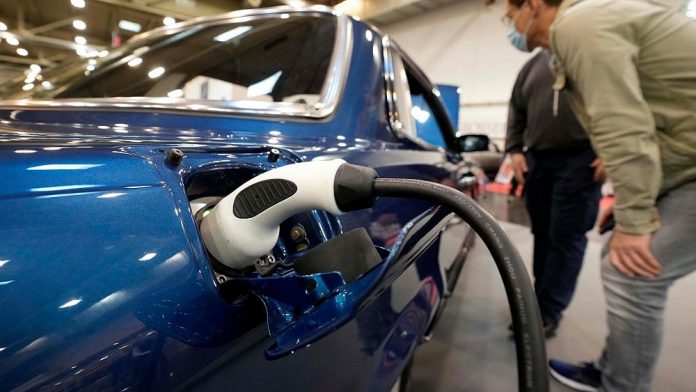The knock-on effects of the energy crisis are being felt everywhere, and it’s a cause for concern for most people – particularly those from lower-income households.
It’s left many people wondering what can be done to cut costs during this time, but could electric or hybrid vehicles offer a helping hand?
We spoke to Tilmann Vahle and Matthias Ballweg, co-leads of the SYSTEMIQ circular mobility platform, to discuss the most commonly asked questions and myths about electric vehicles.
How does the range of electric vehicles (BEV) compare to fuel-powered cars (ICEV)?
The range of electric vehicles generally matches the range of fuel-powered cars and is significantly better than hybrid vehicles. Electric carsalso known as battery-powered electric vehicles (BEV), typically have a range of up to 350 kilometers on a single charge.
And after the battery dies, it can be recharged up to 80 per cent again within a few hours, or even in half an hour for some performance models. Although, this of course also depends on the available power supply of the charging outlet too.
Are the batteries on electric vehicles better than they were in the past?
It would seem so, as battery engines of BEVs are actually designed to outlast the useful life of the vehicle itself.
Currently, around 80 percent of the lifetime of the batteries is 12 to 15 years. This number is constantly rising too and may even increase to as much as 20 years in the near future.
Can you purchase second-hand electric vehicles, and is the process as easy as purchasing non-electric vehicles?
Yes and yes. However, in some markets, electric vehicles are so sought after that used cars may actually be more expensive than new cars.
In the same way you would approach purchasing a second-hand fuel-powered vehicle, you’ll still need technical experts to assess the likely remaining lifetime of the car to give you a reliable price estimate. For modern batteries, there is sophisticated analytical software available that can produce this estimate.
The upcoming EU battery passport will contain all the relevant information to provide the battery life estimate with minimal effort. In the medium term, it will be even easier, cheaper and more reliable to buy second-hand electric cars than regular combustion cars. That means no more ‘lemons’.
How much do electric vehicles cost to run?
Expenses differ widely depending on the local cost conditions, but electric vehicles are always cheaper to run today than regular fuel-powered vehicles. Fuel costs are always temperamental, whereas electricity costs are more stable.
Also, in many EU countries, you can receive subsidies and waivers on certain taxes if you’re purchasing an electric vehicle, reducing the overall costs.
As of 2020, any owner of an electric vehicle in the EU is eligible to participate in the carbon credits scheme to help contribute to improving emission standards too. This could save you between €250-550 per year.
And due to fewer moving parts and less use of the breaks (as electric vehicles mostly break using induction to charge the battery), they have approximately 60 to 90 per cent lower maintenance costs.
Insurance for electric cars may be higher, however, because they tend to be more powerful in acceleration and heavier due to their battery. This is only one of many components that feed into the overall cost to run an electric car though.
How will electric vehicles impact the economy and how will this differ across Europe?
Electric vehicles will undoubtedly impact the economy. For starters, they are much cheaper to run so this will benefit lower-income households.
But also, an increase in demand for electric vehicles means the need for a new infrastructure around charging. Therefore, this infrastructure will require investments and produce lots of manufacturing and electrician jobs. And the work opportunities don’t end there, as people are also needed to work on the performance metals of the batteries.
This new infrastructure will require new and different skills in manufacturing. This means new opportunities for countries, such as the UK, that haven’t been as strong in ICEV manufacturing in recent decades – although it does also open up competition from non-European countries.
Admittedly, there may be fewer jobs in car maintenance as a consequence, but the overall economic prospects appear to be beneficial to both the economy and individuals.
Will electric cars get cheaper before the 2035 ban on fuel-powered cars?
Yes, not only because battery technology advances dramatically – a cost decrease of approximately 50 per cent is likely by 2030 – but also because electric vehicles are simpler to build. They require much fewer moving parts.
Consequently, manufacturing costs could drop between 20 to 40 per cent by 2030, and cars will be cheaper to run and build than they are today.
How safe are electric vehicles and how do they fair in different environments?
looking at Tesla, it would appear electric vehicles are safer than ICEVs. Telsa has consistently ranked as the safest car in crash tests because the battery is incredibly stable.
Similarly, the weather seems to have no greater impact on the functionality of electric vehicles than it does on petrol-powered cars. Norway has the most electric vehicles per capita, so evidently, the country’s extreme cold has not affected them enough to put people off.
In instances of extreme weather, electric vehicles are, ironically, safer to drive than ICEVs. This is because the electrical system is fully sealed to the highest standard. BEVs don’t require air intake like internal combustion engines. They can drive through extremely deep water without polluting it with oil because there isn’t the same leakage risk.

